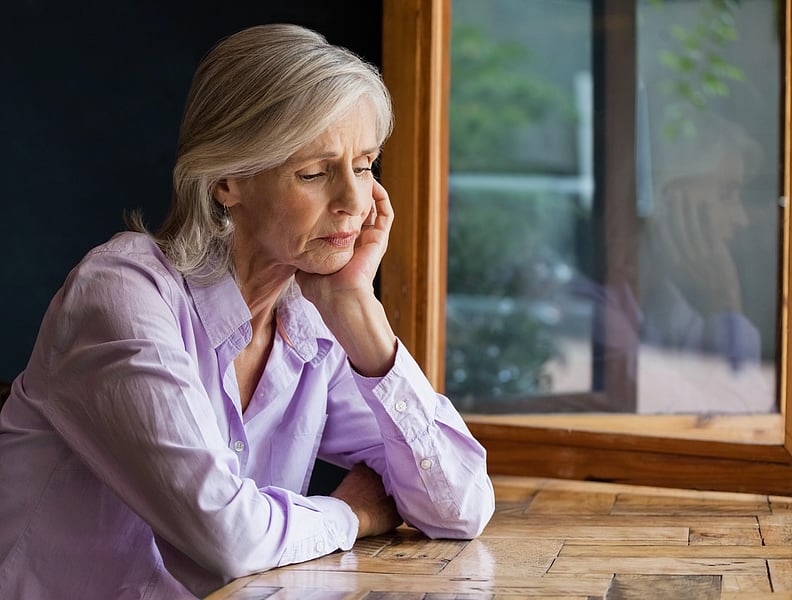Get Healthy!

- By Sydney Murphy HealthDay Reporter
- Posted August 5, 2022
Loneliness Can Be a Real Heartbreaker, Cardiac Experts Warn
Social isolation and loneliness put people at a 30% higher risk of heart attack, stroke or death from either, a new scientific statement from the American Heart Association (AHA) warns.
The statement also highlights the lack of data on interventions that could improve heart health in isolated or lonely people. It was published Aug. 4 in the Journal of the American Heart Association.
“Over four decades of research has clearly demonstrated that social isolation and loneliness are both associated with adverse health outcomes,” said Dr. Crystal Wiley Cené, who headed the team that wrote the statement. “Given the prevalence of social disconnectedness across the U.S., the public health impact is quite significant.”
Nearly a quarter of U.S. adults aged 65 and older are socially isolated, and as many as 47% may be lonely, according to AHA. The risk rises with age due to such factors as retirement and widowhood.
But a Harvard University survey suggests the loneliest generation is Gen Z — 18- to 22-year-olds — which also may be the most isolated. A possible reason: They spend more time on social media and less time engaging in meaningful in-person activities.
And the pandemic appears to have made matters worse among younger and older adults, as well as women and the poor.
“Although social isolation and feeling lonely are related, they are not the same thing,” said Cene, chief administrator for health equity, diversity and inclusion at the University of California San Diego Health. “Individuals can lead a relatively isolated life and not feel lonely, and conversely, people with many social contacts may still experience loneliness.”
Social isolation is having infrequent in-person contact with people for social relationships, such as family, friends, or members of the same community or religious group. Loneliness is when you feel like you are alone or have less connection with others than you desire.
To investigate the relationship between social isolation and heart, blood vessel and brain health, the writing group reviewed research on social isolation published through July 2021. The review found:
- Social isolation and loneliness are frequent but under-appreciated factors that affect the heart, blood vessels and brain.
- Lack of social connections is associated with a higher risk of premature death from any cause, particularly in men.
- Folks who were less socially connected were more likely to exhibit physical symptoms of chronic stress. Isolation and loneliness are linked to increased inflammation.
- When evaluating risk factors for social isolation, it is important to remember that depression may cause isolation, and isolation may make depression more likely.
- Social isolation in childhood is linked to increased heart health risk factors, including obesity, high blood pressure and elevated blood sugar levels.
- Transportation, housing, family discontent, the pandemic and natural disasters are a few social and environmental factors that have affect social interactions.
“There is strong evidence linking social isolation and loneliness with increased risk of worse heart and brain health in general; however, the data on the association with certain outcomes, such as heart failure, dementia and cognitive impairment is sparse,” Cené said.
The strongest evidence points to a connection between social isolation, loneliness, and death from heart disease and stroke, with a 32% higher risk of stroke and death from stroke and a 29% higher heart attack risk.
“Social isolation and loneliness are also associated with worse prognosis in individuals who already have coronary heart disease or stroke,” Cené said.
Along with behaviors that have a detrimental effect on heart and brain health, isolation and loneliness are linked to lower levels of self-reported physical activity and a lower intake of fruits and vegetables. Additionally, numerous large studies have found significant links between loneliness and a higher likelihood of smoking.
“There is an urgent need to develop, implement and evaluate programs and strategies to reduce the negative effects of social isolation and loneliness on cardiovascular and brain health, particularly for at-risk populations,” Cené said in an AHA news release.
She said clinicians should ask patients about their social activity and whether they are satisfied with their level of interaction with friends and family.
“They should then be prepared to refer people who are socially isolated or lonely — especially those with a history of heart disease or stroke — to community resources to help them connect with others,” she added.
The authors said more research is required to understand how isolation affects heart and brain health in children and young adults; people from under-represented racial and ethnic groups; LGBTQ people; people with physical or hearing disabilities; those in rural areas; and people with limited resources.
The statement noted that studies in senior citizens have found that interventions addressing negative thoughts and low self-worth, as well as fitness programs and recreational activities at senior centers, have shown promise in reducing isolation and loneliness.
“It is unclear whether actually being isolated [social isolation] or feeling isolated [loneliness] matters most for cardiovascular and brain health because only a few studies have examined both in the same sample,” Cené said, adding that more research is needed.
More information
The U.S. Centers for Disease Control and Prevention has more about the health risks of loneliness.
SOURCE: American Heart Association, news release, Aug. 3, 2022
